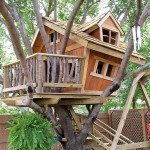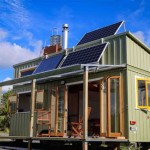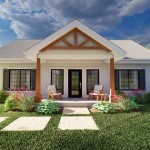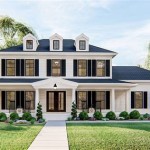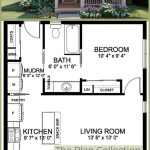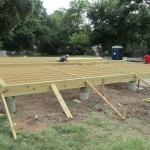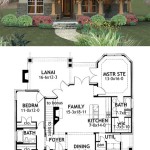A house plan with an inlaw suite is a residential design that incorporates a separate and self-contained living space within a single-family home. This suite is intended to provide comfortable and private accommodation for extended family members, such as aging parents or adult children.
Inlaw suites offer numerous benefits. They allow family members to live close to each other while maintaining their independence. They provide a convenient and accessible solution for caring for elderly relatives, as well as a space for adult children to transition back home after college or a period of living on their own.
In the following sections, we will explore the different types of house plans that include inlaw suites, discuss the features and amenities to consider, and provide tips for designing and building an inlaw suite that meets your specific needs.
Consider these important points when planning a house plan with an inlaw suite:
- Separate entrance
- Private living space
- Kitchenette or full kitchen
- Accessible bathroom
- Universal design features
- Proximity to main house
- Privacy for both parties
- Financial implications
- Resale value
- Zoning regulations
Remember, the goal is to create a comfortable and functional living space that meets the needs of both the extended family member and the homeowner.
Separate entrance
A separate entrance is a crucial feature of an inlaw suite, as it provides privacy and independence for both the extended family member and the homeowner. It allows the suite’s occupant to come and go without disturbing the main household, and it gives them a sense of having their own space.
There are several factors to consider when planning a separate entrance for an inlaw suite:
- Location: The entrance should be placed in a convenient location that allows for easy access to both the suite and the main house. It should also be situated in a way that provides privacy for both parties.
- Type: The type of entrance will depend on the layout of the home and the needs of the occupants. Options include a dedicated exterior door, a door from the garage, or a door from the main house.
- Accessibility: The entrance should be accessible to all occupants, including those with mobility impairments. This may require features such as a ramp, wider doorways, and grab bars.
- Security: The entrance should be secure to prevent unauthorized access. This may include features such as a deadbolt lock, a peephole, and outdoor lighting.
By carefully planning the separate entrance for an inlaw suite, you can ensure that both the extended family member and the homeowner have the privacy and independence they need.
In addition to providing privacy and independence, a separate entrance can also increase the resale value of your home. Potential buyers may be attracted to the flexibility and functionality that an inlaw suite offers, and they may be willing to pay a premium for a home with this feature.
Private living space
A private living space is another essential feature of an inlaw suite, as it provides the extended family member with a place to relax, entertain guests, and pursue their own interests. This space should be separate from the main living areas of the home, and it should be designed to meet the specific needs of the occupant.
When planning the private living space for an inlaw suite, there are several factors to consider:
- Size: The size of the living space will depend on the needs of the occupant. It should be large enough to accommodate comfortable seating, a television, and other desired amenities.
- Layout: The layout of the living space should be designed to promote privacy and independence. It should include a dedicated sleeping area, a bathroom, and a kitchenette or full kitchen.
- Natural light: The living space should have access to natural light, as this can help to create a more comfortable and inviting environment.
- Accessibility: The living space should be accessible to all occupants, including those with mobility impairments. This may require features such as wider doorways, grab bars, and accessible furniture.
By carefully planning the private living space for an inlaw suite, you can ensure that the extended family member has a comfortable and functional space to call their own.
In addition to providing privacy and independence, a private living space can also increase the resale value of your home. Potential buyers may be attracted to the flexibility and functionality that an inlaw suite offers, and they may be willing to pay a premium for a home with this feature.
Kitchenette or full kitchen
An inlaw suite can be equipped with either a kitchenette or a full kitchen, depending on the needs of the occupants. A kitchenette is a small kitchen that typically includes a sink, a refrigerator, a microwave, and a few basic appliances. A full kitchen, on the other hand, is a larger kitchen that includes a full-size refrigerator, a stove, an oven, and a dishwasher.
- Kitchenette
A kitchenette is a good option for inlaw suites that are intended for short-term stays or for occupants who do not cook frequently. It provides basic cooking and food preparation capabilities, but it does not take up as much space as a full kitchen.
- Full kitchen
A full kitchen is a good option for inlaw suites that are intended for long-term stays or for occupants who cook frequently. It provides a full range of cooking and food preparation capabilities, and it allows the occupants to prepare meals as they would in their own home.
When deciding whether to include a kitchenette or a full kitchen in an inlaw suite, there are several factors to consider:
- Cooking habits of the occupants
- Frequency of use
- Available space
- Budget
By carefully considering these factors, you can choose the best option for your specific needs.
Accessible bathroom
An accessible bathroom is an important feature of an inlaw suite, as it provides a safe and comfortable space for occupants with mobility impairments. An accessible bathroom should be designed to meet the specific needs of the occupant, but there are some general guidelines that can be followed.
- Roll-in shower
A roll-in shower is a shower that has a curbless entry, making it easy for wheelchair users to enter and exit. Roll-in showers typically have a built-in seat and grab bars for added safety.
- Grab bars
Grab bars are metal bars that are installed in the bathroom to provide support and stability for occupants with mobility impairments. Grab bars should be placed near the toilet, shower, and bathtub.
- Raised toilet seat
A raised toilet seat is a toilet seat that is higher than a standard toilet seat, making it easier for occupants with mobility impairments to sit down and stand up.
- Non-slip flooring
Non-slip flooring is a type of flooring that has a high coefficient of friction, making it less likely to slip and fall. Non-slip flooring is a good choice for bathrooms in inlaw suites.
By including these features in the bathroom of an inlaw suite, you can create a safe and comfortable space for occupants with mobility impairments.
Universal design features
Universal design features are design elements that make a space accessible and usable by people of all abilities. When incorporated into an inlaw suite, these features can make the space more comfortable and convenient for occupants with mobility impairments, cognitive impairments, or other disabilities.
- Wide doorways
Wide doorways are doorways that are at least 32 inches wide, making it easier for wheelchair users and people with other mobility impairments to enter and exit rooms.
- Lever door handles
Lever door handles are door handles that are easy to use for people with arthritis or other hand impairments. They are also easier to use for people who are in a wheelchair.
- Accessible light switches and outlets
Accessible light switches and outlets are light switches and outlets that are placed at a height that is easy to reach for people in a wheelchair or for people who have difficulty bending over.
- Non-slip flooring
Non-slip flooring is a type of flooring that has a high coefficient of friction, making it less likely to slip and fall. Non-slip flooring is a good choice for bathrooms and other areas where there is a risk of slipping.
By including universal design features in an inlaw suite, you can create a space that is safe and comfortable for all occupants, regardless of their abilities.
Proximity to main house
The proximity of the inlaw suite to the main house is an important consideration. There are several factors to weigh when making this decision:
- Convenience
If the inlaw suite is too far from the main house, it may be inconvenient for both the occupants of the suite and the homeowners. This is especially important for occupants who have mobility impairments or who need frequent assistance.
- Privacy
If the inlaw suite is too close to the main house, it may not provide enough privacy for the occupants of either space. This is especially important for occupants who need a quiet and peaceful environment.
- Safety
If the inlaw suite is too far from the main house, it may not be safe for the occupants of the suite, especially at night. This is especially important for occupants who live alone or who have health concerns.
- Resale value
The proximity of the inlaw suite to the main house can affect the resale value of the home. Potential buyers may be more interested in homes with inlaw suites that are conveniently located, but they may be less interested in homes with inlaw suites that are too close to the main house.
By carefully considering these factors, you can choose the best location for the inlaw suite on your property.
Privacy for both parties
Privacy is an important consideration in the design of any inlaw suite. Both the occupants of the suite and the homeowners need to have their own private spaces where they can relax and feel comfortable. There are several design features that can be used to ensure privacy for both parties:
- Separate entrances
Separate entrances for the inlaw suite and the main house are essential for privacy. This allows the occupants of the suite to come and go without disturbing the homeowners, and it gives them a sense of having their own space.
- Private living spaces
The inlaw suite should have its own private living space, separate from the main living areas of the home. This space should include a bedroom, bathroom, and kitchenette or full kitchen. It should also be designed to minimize noise transmission between the suite and the main house.
- Soundproofing
Soundproofing can be used to reduce noise transmission between the inlaw suite and the main house. This can be done by installing soundproofing materials in the walls, ceilings, and floors of the suite. It can also be done by using sound-absorbing materials, such as carpets and curtains.
- Separate outdoor spaces
If possible, the inlaw suite should have its own private outdoor space, such as a patio or deck. This gives the occupants of the suite a place to relax and enjoy the outdoors without having to share space with the homeowners.
By incorporating these design features into the inlaw suite, you can ensure privacy for both the occupants of the suite and the homeowners.
Financial implications
There are several financial implications to consider when planning a house plan with an inlaw suite. These include:
- Construction costs
The cost of constructing an inlaw suite will vary depending on the size, complexity, and features of the suite. In general, you can expect to pay between $100,000 and $200,000 to build an inlaw suite. However, the cost may be higher if the suite is particularly large or if it includes high-end finishes.
- Utility costs
The inlaw suite will have its own utility costs, such as electricity, gas, and water. These costs will need to be factored into the overall budget for the suite.
- Maintenance costs
The inlaw suite will also require ongoing maintenance costs, such as repairs, painting, and landscaping. These costs should also be factored into the overall budget for the suite.
- Resale value
An inlaw suite can add value to your home, especially if it is well-designed and well-maintained. However, it is important to remember that the cost of building an inlaw suite may not be fully recouped when you sell your home. This is especially true if the suite is designed for a specific individual or if it is not in high demand in your area.
It is important to carefully consider the financial implications of building an inlaw suite before you begin construction. You should develop a realistic budget that includes all of the costs associated with the suite, both upfront and ongoing. You should also consider the potential impact of the suite on the resale value of your home.
Resale value
An inlaw suite can add value to your home, especially if it is well-designed and well-maintained. However, it is important to remember that the cost of building an inlaw suite may not be fully recouped when you sell your home. This is especially true if the suite is designed for a specific individual or if it is not in high demand in your area.
There are several factors that can affect the resale value of a home with an inlaw suite:
- Location
The location of the inlaw suite can affect its resale value. In general, inlaw suites that are located in desirable neighborhoods and school districts will have a higher resale value than those that are located in less desirable areas.
- Size and layout
The size and layout of the inlaw suite can also affect its resale value. In general, larger inlaw suites with more features will have a higher resale value than smaller inlaw suites with fewer features.
- Condition
The condition of the inlaw suite can also affect its resale value. In general, inlaw suites that are well-maintained and in good condition will have a higher resale value than those that are not well-maintained or in poor condition.
- Demand
The demand for inlaw suites in your area can also affect the resale value of your home. In general, inlaw suites will have a higher resale value in areas where there is a high demand for this type of housing.
If you are considering building an inlaw suite, it is important to carefully consider the potential impact on the resale value of your home. You should also consult with a real estate agent to get an estimate of the potential resale value of your home with and without an inlaw suite.
Zoning regulations
Zoning regulations are laws that govern the use of land and buildings in a specific area. These regulations can affect whether or not you are allowed to build an inlaw suite on your property.
- Setbacks
Setbacks are the minimum distances that a building must be set back from the property line. Zoning regulations may require that inlaw suites be set back a certain distance from the front, side, and rear property lines. This is to ensure that the inlaw suite does not encroach on theneighbors’ properties or block their views.
- Lot size
Zoning regulations may also specify the minimum lot size required for a property to have an inlaw suite. This is to ensure that the inlaw suite does not overcrowd the property or create traffic congestion.
- Building height
Zoning regulations may also limit the height of buildings on a property. This is to ensure that the inlaw suite does not obstruct the views of neighboring properties or create a hazard.
- Permitted uses
Zoning regulations may also specify the permitted uses for a property. In some cases, zoning regulations may only allow inlaw suites to be used for certain purposes, such as housing elderly relatives or adult children. It is important to check the zoning regulations for your property to determine if an inlaw suite is a permitted use.
If you are considering building an inlaw suite, it is important to check the zoning regulations for your property to determine if it is allowed. You can also contact your local planning department for more information about the zoning regulations in your area.










Related Posts


